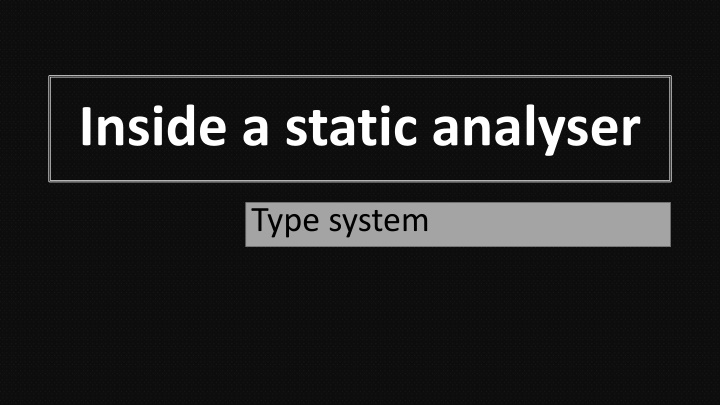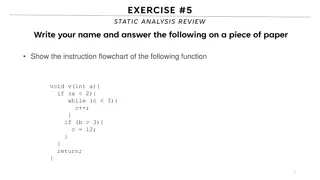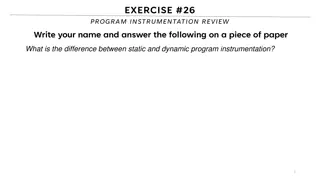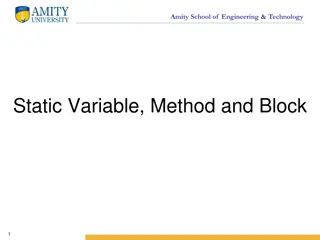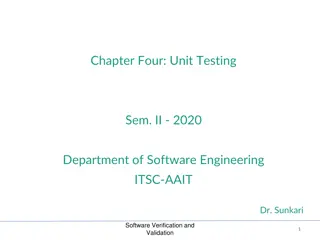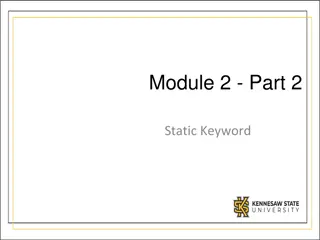Inside a Static Analyser Type System
A glimpse into the world of static analyzers and the intricacies of a C/C++ developer's work on a code analyzer. Explore the components, functionalities, types, and challenges faced in this realm. Dive into the details of representing C and C++ types, compiler optimizations, diagnostic rules, and more.
Download Presentation

Please find below an Image/Link to download the presentation.
The content on the website is provided AS IS for your information and personal use only. It may not be sold, licensed, or shared on other websites without obtaining consent from the author.If you encounter any issues during the download, it is possible that the publisher has removed the file from their server.
You are allowed to download the files provided on this website for personal or commercial use, subject to the condition that they are used lawfully. All files are the property of their respective owners.
The content on the website is provided AS IS for your information and personal use only. It may not be sold, licensed, or shared on other websites without obtaining consent from the author.
E N D
Presentation Transcript
Inside a static analyser Type system
About me A C++ developer at PVS-Studio. Working on the core functionality and diagnostic rules of the C/C++ static code analyzer. 2
What is this about We'll take a look at: What a static analyser is What's inside of it One specific aspect representing C and C++ types Our story of change 3
A static analyser? Compiler Middle end Optimisations Frontend IR Syntax Semantics Types IR Backend Code generation 4
A static analyser? Static analyser Frontend Diagnostics Syntax Semantics Types These are like compiler warnings, but somewhat more comprehensive. 5
A static analyser? Compiler Compiler Middle end Middle end Backend Backend Code Code Frontend Diagnostics Diagnostics Log Log Statis analyser Statis analyser 6
Back to types Built in types User-defined types Derived types Structure Array Integral Class Function void Union Pointer Floating-point Enum Reference 7
Representing types 1 2 const int* P C i \0 8
Encoding Pros Cons Slow Involves inefficient algorithms Multiple passes might be needed Overall inconvenient to work with Better locality (cache-friendly) ??? 9
Another tiny issue int *p; Pi class MyClass { int x; }; \aMyClass FiPPCc-i int main(int argc, const char **argv); std::array<MyClass, 10> arr; Q \x2 \x3stdT \x5array \x15 \aMyClass*12345678 11
Huge problems auto someType = // get type info about some entity if (!someType.IsFunction()) { return false; } A quick "bug-out" check // a very computation-heavy piece of code goes here Or is it? 12
Huge problems bool TypeInfo::IsFunction() { Normalize(); auto e = m_env; auto ptr = SkipCvde(m_encode, e); return ptr && *ptr == 'F'; } How many loops? 13
Let's estimate TypeInfo::Normalize Check cv-qualifiers Traverse string, set internal fields Resolve typedefs Go and look in the symbol table Figure out template arguments Voodoo magic here Extract class info Go and look in the symbol table 14
Let's estimate TypeInfo::Normalize Loop Check cv-qualifiers Traverse string, set internal fields Recursion ??? Resolve typedefs Go and look in the symbol table Figure out template arguments Recursion Voodoo magic here Extract class info Go and look in the symbol table Recursion 15
So? Checking what something is MUST be O(1). It's that simple 16
But first... 18
Structure Type Id Canonical type Builtin Pointer Reference Function Class Alias etc. Derived classes Specific info 19
Id auto someType = // get type info about some entity if (!someType.IsA(TypeId::Function)) { return false; } A quick "bug-out" check // a very computation-heavy piece of code goes here Or is it? 20
Id template <typename TypeId, typename ...TypeIds> bool IsA(TypeId id, TypeIds ...ids) const noexcept { return ((What() == id) || ... || (What() == ids)); } { return m_id; // enum class Id : uint8_t } 21
Canonical type int a = 42; Type: Builtin, int Canonical: Builtin, int typedef int MyInt; MyInt a = 42; Type: Alias, typedef Canonical: Builtin, int 22
Canonical type typedef int MyInt; using TheUltimateIntOfDoom = MyInt; TheUltimateIntOfDoom a = 42; Type: Alias, using Canonical: Builtin, int Source: Alias, typedef 23
Alias Enum CastOperator Class Builtin ClassMember Function Ctor Dtor Complex Operator MemberPointer Auto AssignOp Type Pointer Decltype Array Template Adjusted Reference TemplateVar TemplateParam SubstPack Deduced TemplateSpec Decayed TemplateInstance SubstTemplateArg 24
Qualifiers const volatile int tricky = 42; ? Type: ConstVolatileBuiltin, int 25
Qualifiers QualType Address in memory 0x00 5 bits C V R 26
Quality pointer QualType Type qualifiers: const volatile restrict Pointer to the base Type class 27
How it fits together Type System Factory Cache Traits Hasher 28
Profit Types are immutable There's only one copy of each unique type To compare types, you just compare hash values Type "pointers" (QualType) are not nullable 29
public: Id What() const noexcept; bool IsUnresolved() const noexcept; bool IsAnyAutoType() const noexcept; Base Type class QualType GetCanonical() const noexcept; QualType Wrap(TypeQualifiers quals = {}) const noexcept; size_type Sizeof() const noexcept; size_type Alignof() const noexcept; private: QualType m_canonical; hash_type m_hash = 0; Id m_id; 30
public: QualType Dereference() const noexcept; PointerType template <typename TypeId, typename ...TypeIds> bool IsAnyOf(TypeId id, TypeIds... ids) const noexcept { return m_pointee->GetCanonical().IsA(id, ids...); } private: QualType m_pointee; 31
Polymorphism? bool IsThisAnIntPointer(QualType qt) { if (auto t = qt.TryGetAs<PointerType>()) { auto p = t->Dereference() .TryGetAs<BuiltinType>(); return p && p->IsAnyInt(); } return false; } 32
template <typename T> auto TryGetAs() const noexcept { #define MAKE_TYPE_TRAITS(t, id) \ template <> struct type_id_from_type<t> \ { \ static constexpr TypeId value = id; \ }; \ template <> struct type_from_type_id<id> \ { \ using type = t; \ }; return To<T>(GetTypePtr()); } template <typename T> auto To(Type* src) noexcept -> std::remove_const_t<T>* { return IsA(src, type_id_from_type_v<T>) ? static_cast<std::remove_const_t<T>*>(src) : nullptr; } 33
Another way bool IsThisAnIntPointer(QualType qt) { if (!Traits::IsPointer(qt)) return false; auto t = Traits::RemovePointer(qt) .TryGetAs<BuiltinType>(); return t && t->IsAnyInt(); } 34
Traits 35
Traits QualType Traits::Decay(QualType qt) { auto type = RemoveCVRef(qt); if (IsFunction(type)) return AddPointer(type); if (auto arrT = type.TryGetAs<TypeId::Array>()) return AddPointer(arrT->GetElementType()); return type; } 36
How it fits together Diagnostic rule auto type = decl->GetType(); if(Traits::/*....*/) { //.... } int* p = nullptr; AST (declaration) Parser auto pointee = TypeSystem::GetBuiltin(BuiltinId::Int).Wrap(); auto result = Traits::AddPointer(pointee); 37
Summary 38
QUESTIONS Inside a static analyser: type system Yuri Minaev minaev@viva64.com 39
